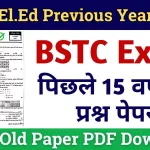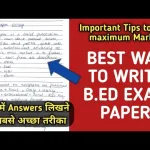Questions and answers from the JBT (Junior Basic Training) exam 2018 across various subjects. These include Child Development and Pedagogy, English, Mathematics, Environmental Studies, Social Studies, Science, and General Knowledge.
50 jbt question paper with answer for 2018 year
Child Development and Pedagogy
- Q: What is the primary focus of child-centered education? A: The needs and interests of the child.
- Q: According to Piaget, at what stage does a child begin to engage in logical thinking? A: Concrete operational stage.
- Q: What is Vygotsky’s term for the difference between what a child can do alone and what they can do with help? A: Zone of Proximal Development (ZPD).
- Q: What is the most effective way to enhance learning in a classroom? A: Using interactive and engaging activities.
- Q: According to Kohlberg, which stage involves children understanding and obeying laws and rules? A: Conventional level.
English
- Q: Identify the part of speech of the underlined word: She is singing beautifully. A: Verb.
- Q: What is the past tense of the verb “run”? A: Ran.
- Q: Choose the correct preposition: She sat ___ the chair. A: On.
- Q: Which of the following is a compound sentence? A: I went to the market, and I bought some apples.
- Q: Fill in the blank with the correct article: She has ___ umbrella. A: An.
Mathematics
- Q: What is 25% of 200? A: 50.
- Q: Solve for x: 2x + 3 = 11. A: x = 4.
- Q: What is the perimeter of a rectangle with length 10 cm and width 5 cm? A: 30 cm.
- Q: Convert 0.75 to a fraction. A: 3/4.
- Q: What is the next number in the sequence: 2, 4, 8, 16, ___? A: 32.
Environmental Studies
- Q: What is the process by which plants make their food? A: Photosynthesis.
- Q: Name the largest planet in our solar system. A: Jupiter.
- Q: What is the main source of energy for the Earth? A: The Sun.
- Q: Which part of the plant is responsible for absorbing water and nutrients? A: Roots.
- Q: What is the primary gas found in the Earth’s atmosphere? A: Nitrogen.
Social Studies
- Q: Who was the first President of India? A: Dr. Rajendra Prasad.
- Q: What is the capital of Himachal Pradesh? A: Shimla.
- Q: In which year did India gain independence? A: 1947.
- Q: Name the river that is considered sacred in Hinduism. A: Ganges.
- Q: Who wrote the national anthem of India? A: Rabindranath Tagore.
Science
- Q: What is the chemical formula for water? A: H₂O.
- Q: What is the boiling point of water in degrees Celsius? A: 100°C.
- Q: Which organ is responsible for pumping blood throughout the body? A: Heart.
- Q: What type of energy is stored in a battery? A: Chemical energy.
- Q: What is the smallest unit of life? A: Cell.
General Knowledge
- Q: Who is known as the Father of the Indian Nation? A: Mahatma Gandhi.
- Q: What is the national animal of India? A: Bengal Tiger.
- Q: Who is the current Prime Minister of India? (as of 2018) A: Narendra Modi.
- Q: Name the largest continent by area. A: Asia.
- Q: Which festival is known as the Festival of Lights in India? A: Diwali.
Additional Questions
- Q: What is the capital of India? A: New Delhi.
- Q: Who discovered the law of gravity? A: Isaac Newton.
- Q: What is the longest river in the world? A: Nile River.
- Q: Who is known as the Nightingale of India? A: Sarojini Naidu.
- Q: What is the main language spoken in Brazil? A: Portuguese.
- Q: Which planet is known as the Red Planet? A: Mars.
- Q: What is the largest mammal in the world? A: Blue Whale.
- Q: What currency is used in Japan? A: Yen.
- Q: Who wrote the play “Romeo and Juliet”? A: William Shakespeare.
- Q: What is the national sport of Canada? A: Ice Hockey.
- Q: What is the chemical symbol for gold? A: Au.
- Q: Who was the first man to step on the moon? A: Neil Armstrong.
- Q: What is the tallest mountain in the world? A: Mount Everest.
- Q: Who is the author of “Harry Potter” series? A: J.K. Rowling.
- Q: What is the most widely spoken language in the world? A: Mandarin Chinese.
The Junior Basic Training (JBT) Examination 2018: A Comprehensive Analysis
The Junior Basic Training (JBT) examination is a significant milestone for aspiring primary school teachers in India. This exam assesses the pedagogical skills and subject knowledge of candidates who wish to teach at the elementary level. The JBT examination in 2018, like its predecessors, was designed to evaluate candidates on a variety of competencies necessary for effective teaching. This article delves into the structure, content, and relevance of the JBT question paper of 2018, offering insights into its various components and the preparation strategies essential for success.
Overview of the JBT Examination
The JBT examination is conducted by various state education boards in India, with the Himachal Pradesh Board of School Education (HPBOSE) being a prominent organizer. The test aims to certify teachers for elementary education, ensuring they possess the required skills to foster young minds. The 2018 JBT exam continued this tradition, focusing on multiple areas of knowledge critical for teaching at the primary level.
Structure and Format of the 2018 JBT Question Paper
The JBT exam typically comprises multiple-choice questions (MCQs) designed to test a wide range of skills. In 2018, the examination maintained a similar structure, divided into various sections including Child Development and Pedagogy, English, Mathematics, Environmental Studies, Social Studies, Science, and General Knowledge. Each section aimed to assess the candidates’ proficiency in both theoretical knowledge and practical application.
- Child Development and Pedagogy: This section focused on understanding the psychological and developmental stages of children, educational theories, and pedagogical strategies. It tested candidates on their ability to create conducive learning environments, address diverse learning needs, and implement effective teaching methodologies.
- English: The English section evaluated the candidates’ command over the language, including grammar, vocabulary, comprehension, and communication skills. It was crucial for ensuring that future teachers could impart language skills effectively.
- Mathematics: This segment tested basic mathematical concepts, problem-solving abilities, and the application of mathematical principles. It included questions on arithmetic, geometry, algebra, and data interpretation, reflecting the need for teachers to simplify complex concepts for young learners.
- Environmental Studies: The EVS section covered topics related to the environment, including natural resources, ecological balance, and environmental protection. It aimed to gauge the candidates’ awareness and ability to teach children about sustainable practices and environmental stewardship.
- Social Studies: This part included questions on history, geography, civics, and economics. It tested the candidates’ knowledge of social structures, historical events, geographical features, and civic responsibilities, essential for teaching young students about their world and society.
- Science: The science section covered fundamental scientific concepts, including biology, chemistry, physics, and everyday science. It assessed the candidates’ ability to explain scientific phenomena and foster a sense of curiosity and inquiry among students.
- General Knowledge: This section tested current affairs, general awareness, and basic knowledge about important events, personalities, and developments in various fields. It was designed to ensure that teachers remain well-informed and can impart a well-rounded education.
Key Features of the 2018 JBT Question Paper
The 2018 JBT question paper was crafted to balance difficulty levels, ensuring a comprehensive assessment of all candidates. Some key features included:
- Diversity of Questions: The question paper included a mix of easy, moderate, and challenging questions to cater to the varied proficiency levels of candidates.
- Application-Based Questions: Many questions required candidates to apply theoretical knowledge to practical scenarios, reflecting real-life teaching situations.
- Balanced Weightage: Each section was given appropriate weightage, ensuring that all critical areas of teaching were covered.
- Updated Content: The questions were based on the latest syllabus and included current trends in education and relevant developments in various subjects.
Importance of the JBT Examination
The JBT examination holds significant importance for several reasons:
- Standardization of Teacher Quality: By evaluating the competencies of aspiring teachers, the JBT exam ensures a standard level of teaching quality across elementary schools.
- Focus on Pedagogy: The emphasis on child development and pedagogy ensures that teachers are not only knowledgeable but also skilled in effective teaching methods.
- Holistic Assessment: The diverse sections of the exam ensure that teachers possess a well-rounded knowledge base, essential for nurturing young learners.
- Professional Certification: Passing the JBT exam is a requisite for obtaining a teaching certification, making it a critical step in the career path of elementary educators.
Preparation Strategies for the JBT Examination
Success in the JBT examination requires a well-planned preparation strategy. Here are some effective tips:
- Understand the Syllabus: Familiarize yourself with the detailed syllabus and exam pattern. Focus on the key areas and allocate time accordingly.
- Practice with Previous Papers: Solve previous years’ question papers to get a feel of the exam format and the types of questions asked. This helps in identifying important topics and improving time management.
- Focus on Pedagogy: Given the emphasis on child development and pedagogy, ensure a thorough understanding of educational theories, teaching methods, and classroom management strategies.
- Strengthen Subject Knowledge: Review fundamental concepts in each subject area. Use textbooks, reference materials, and online resources to clarify doubts and deepen your understanding.
- Stay Updated: Keep abreast of current affairs and developments in the education sector. Read newspapers, follow educational blogs, and participate in relevant discussions.
- Mock Tests: Regularly take mock tests to assess your preparation level. Analyze your performance, identify weak areas, and work on improving them.
- Time Management: Develop effective time management skills to ensure you can complete the exam within the given time frame. Practice solving questions quickly and accurately.
Challenges and Solutions in Preparing for the JBT Exam
Preparing for the JBT exam can be challenging due to its comprehensive nature. Some common challenges include:
- Broad Syllabus: The extensive syllabus can be overwhelming. To manage this, create a study schedule that covers all topics systematically.
- Balancing Multiple Subjects: Juggling different subjects can be difficult. Focus on one subject at a time and ensure a strong grasp of each before moving on to the next.
- Application-Based Questions: Practical questions can be tricky. Practice with real-life scenarios and previous papers to develop problem-solving skills.
- Maintaining Consistency: Consistent study habits are crucial. Set daily study goals and adhere to your schedule to maintain momentum.
The Role of Coaching and Self-Study
While some candidates opt for coaching classes, others prefer self-study. Both approaches have their advantages:
- Coaching Classes: Provide structured learning, expert guidance, and peer interaction. They are beneficial for those who need a disciplined study environment and additional support.
- Self-Study: Offers flexibility and allows candidates to study at their own pace. It is suitable for disciplined individuals who can manage their study schedules effectively.
Combining both approaches can also be beneficial. For instance, attending coaching classes for difficult subjects and self-studying the rest can provide a balanced preparation strategy.
The Impact of the JBT Examination on Teaching Careers
Clearing the JBT examination opens up numerous opportunities for aspiring teachers. It serves as a gateway to a rewarding career in elementary education, with several benefits:
- Job Opportunities: Certified JBT teachers are eligible for teaching positions in government and private schools, enhancing their employability.
- Professional Growth: The certification paves the way for further professional development, including advanced studies and specialized training programs.
- Contribution to Education: JBT-certified teachers play a crucial role in shaping the future of young learners, contributing to the overall development of the education system.
Latest Posts
- Step-by-step guide to download and apply for jee mains admit card 202
- Comprehensive 2025 government holidays and recruitment details for job seekers
- JEE Mains Admit Card 2025: Your Step-by-Step Guide to Downloading the Hall Ticket
- Everything You Need to Know About 2025 Government Holidays Recruitment
- Comprehensive Guide to rrb d group recruitment 2025 – Eligibility, Vacancies, and Application
- Detailed guide to nps trust recruitment 2025 vacancies, eligibility and apply process
- Comprehensive guide to hpcl recruitment 2025 notification, vacancies, and application process
- ignou bed admission 2025 complete recruitment guide with eligibility and process
- Comprehensive Guide to Indian Army Agniveer Recruitment 2025 Notification and Jobs
- Everything You Must Know About CBSE Board Exams 2025 Changes & New Rules






